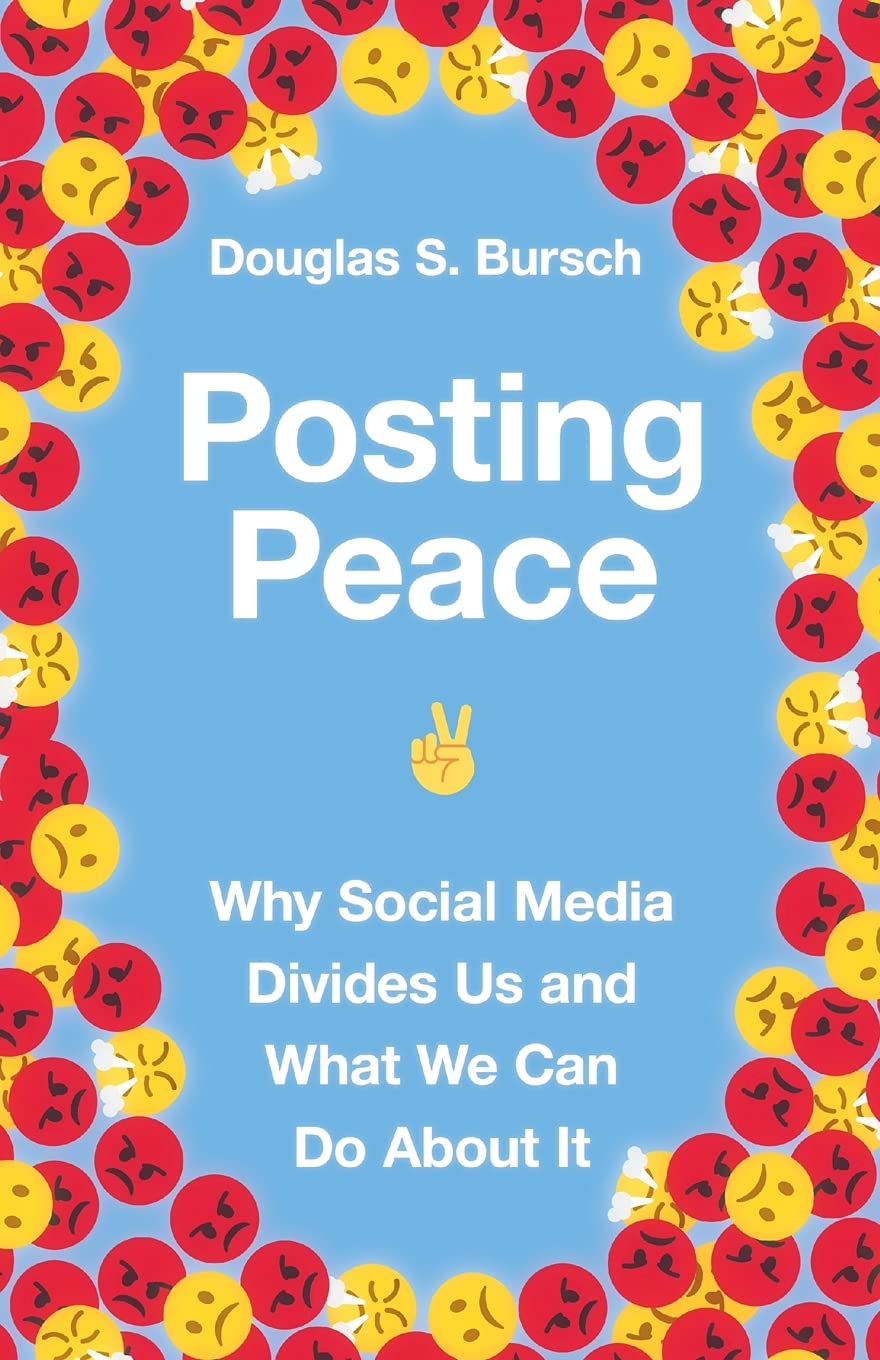Last summer, I deleted social media from my phone for several months. I shut down my Twitter account, said goodbye to the daily distraction of Instagram, and limited my time on Facebook to work-related activities. Almost immediately I felt able to breathe a little easier, and both the anxiety and comparison I’d been wading into disappeared like fog into midday.
In the midst of cultural unrest, the 2020 election, and facing a global pandemic for the first time, I bet I’m not alone in my decision to remove from my life one more temptation to worry or speak harshly to a stranger. As I’ve talked with friends in the last few months, the comments echo each other: the arguments, tension, and one-sided monologues on social platforms like Twitter and Facebook invoke a weariness none of us was made to carry.
In his new book, Posting Peace: Why Social Media Divides Us and What We Can Do About It, Douglas S. Bursch—pastor, former radio talk-show host, and newspaper columnist—explores how faith in Christ and trust in his call for us as peacemakers should reshape how we use social media.

Posting Peace: Why Social Media Divides Us and What We Can Do About It
Douglas S. Bursch
Posting Peace: Why Social Media Divides Us and What We Can Do About It
Douglas S. Bursch
Why is everyone so angry online? The internet seems to have brought the world together only so we can tear each other apart. Social media platforms have become toxic and polarizing environments. Many of us are overwhelmed and disillusioned by endless online conflict and negativity. How did we get here, and what can we do about it?
The internet changes not only how we communicate but also what we communicate. Pastor and former radio host Douglas Bursch provides a spiritual examination of why social media divides people and how Christians can address polarization through a ministry of peacemaking. Digital media dehumanizes and disembodies us, dulling our ability to know when to speak and when to remain silent. But healthy online communication is possible through a constructive posture of reconciliation. Bursch offers practical examples of how to proactively manage social media and handle online conflict in redemptive ways. Together we can change the discourse of online Christian communication. Discover how we can use social media in a positive, Christ-like manner.
Social media are a tool that can be used for good. Not only do we share ideas through them, but beautiful words, images, and stories can transmit from continent to continent in seconds. But like many other good things in life, social media can become distorted and twisted, which is one of Bursch’s points: “The social-media platforms we create are not just connecting us—they’re changing us. They’re changing how we view reality, understand relationships, process conflicts, and abide with each other” (5).
The arguments, tension, and one-sided monologues on social platforms like Twitter and Facebook invoke a weariness none of us was made to carry.
As Christ followers, we’re called to make peace. So why do we continue scrolling, posting, and commenting about things that distract us from what really matters or, even worse, cause us to treat another human without empathy or compassion?
Easily Provoked
Bursch shows how conversations, relationships, and reality in our online worlds are often one-sided. Because we can’t see facial expressions and body language or hear someone’s tone, we only receive half a person’s response, leading to miscommunication and often rage.
The anger we see online is pervasive. All we need to do is look back at the last year. And with that online anger, we’re often blinded to how social media create unnecessary tension, anxiety, or frustration and how that affects our everyday lives. Road rage, aggravation at a spouse or a child, critical thoughts about your pastor—they move from a screen to your living room. As Bursch writes, “What becomes normalized in our social-media practices becomes standardized in our marriages, families, and friendships.”
What becomes normalized in our social-media practices becomes standardized in our marriages, families, and friendships.
Throughout Posting Peace, Bursch explores ideas about individualism and how it provides a false sense of correctness (but actually leads to more isolation); our struggle to engage and remain in the present; and the divide we experience in politics and what that does to our souls—not to mention our churches and relationships. He then moves to the solution.
Answer to the Anger
The solution? Remember Christ’s call to reconcile and make peace in his name. In a world fraught with dissension, to seek peace is to seek a different way. And the search for this peace isn’t through ignoring the difficult or dark places of the world, but moving toward them with a different attitude than what we see on social media. According to Bursch:
Peacemaking is not the avoidance of conflict, but the confrontation of sin and injustice with the reconciling good news of Jesus Christ. Peacemakers bring people into alignment with Christ through opposing their rebellions. (146)
To seek reconciliation instead of being right is a radical way to show others God’s character. One of the ways Bursch encourages readers to move from divisive online behavior is to remember their own reconciliation story: remember how God saved you when you’re tempted to push the argument online or prove your theological point to someone through a screen.
To seek reconciliation instead of being right is a radical way to show others God’s character.
Before I removed social media from my phone, the anger and outrage of those “around” me felt like too much. Instead of Christians speaking the truth in love, I watched them devour each other over things that won’t last. The counterpoint to all of this is simple: seek peace before you seek your own desires, remembering that “[w]e cannot change everything overnight. However, we can radically change the way we abide with each other online if we prayerfully listen to God and take Spirit-led steps that welcome the reconciling presence of God” (94).
Make Room for Peace
Some readers may find the topic of online peacemaking foreign—whether from a lack of social-media accounts, a non-confrontational spirit, or a desire to remain neutral—and that is one potential limitation of the book. While peacemaking applies to all Christians, not all believers will struggle with the online conflict Bursch explores. So while the topic of Posting Peace is relevant and necessary, it might be more beneficial for readers who struggle to know whether their online interactions are healthy and Christlike.
In his chapter called “A Peacemaking Plan,” Bursch provides five helpful principles for better communicating with those around you:
- Is reconciliation my motive?
- Are people my priority?
- Am I communicating truth with love?
- Where is the grace?
- What is the Spirit saying?
The calling on our lives as peacemakers is one that the church—and the world—needs more now than ever. It allows room for conversation instead of defensiveness, compassion and empathy instead of correction or outburst. And it “makes room for Jesus. When we engage in reconciling behavior, we welcome the perspective and presence of Jesus into our interactions” (179). And really that’s all we need.
































